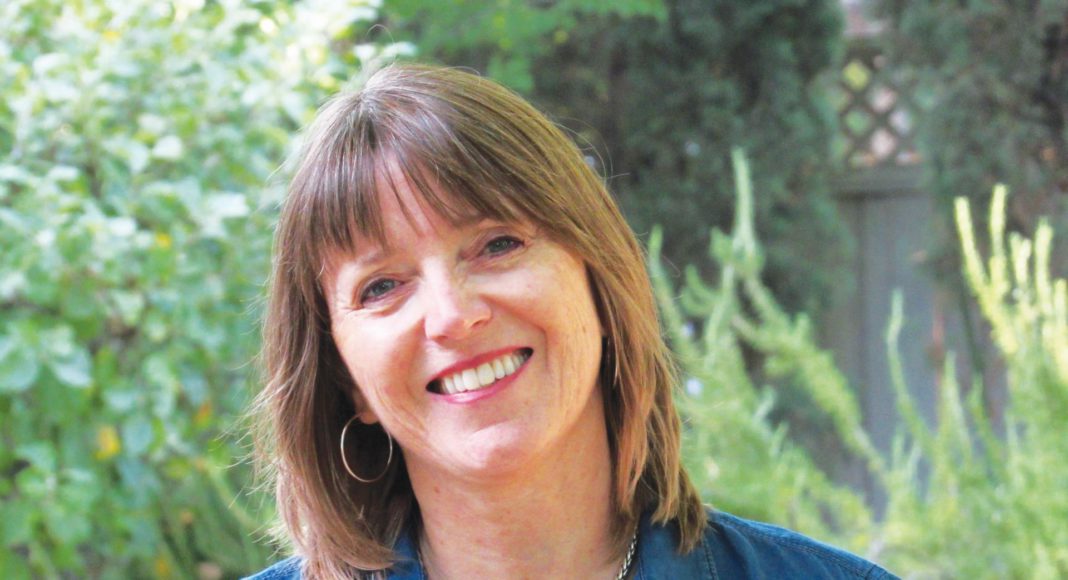Of the many ways we humans have tried to capture the sublime sadness of all we lost through the height of the pandemic, this single line—“Rocketship goodbyes”—written by Sally Ashton in her poem “Circumferences,” stands out the most. Enter Listening to Mars.
To express an ending as a rocket leaving Earth is to evoke intensity—extreme distance, rapid pace, surreal proportion. Reading it feels a lot like losing a person without being able to hold their hand, a lot like losing a taken-for-granted way of life.
Believe it or not, it was four years ago, almost to the day, that Bay Area counties issued the most rigid “shelter in place” orders in the United States. For Sally Ashton, Editor-in-Chief of The DMQ Review and former Santa Clara County Poet Laureate, the project of processing this uncanny global experience began at that moment. However, it would take her years to understand that the bits and pieces of text she wrote through the pandemic comprised her fifth book.
Anchored by celestial themes, that book, Listening to Mars, came out on Cornerstone Press last Feb. It takes its ethos from a sentiment often attributed to Apollo 8 commander Frank Borman, who found himself at a loss of words upon humanity’s first view of Earth rising above the surface of the moon in 1968: “‘What they should have sent was a poet,’” Ashton quotes.
“The book begins with the pandemic’s first year and attempts to chronicle the shocks to human existence,” Ashton explained at her book launch earlier this month at Montalvo Arts Center. The historic villa where she read from the book to a large crowd is just across the lawn from the studio space where, in the final phase of editing, she taped pages and pages of her pandemic poems to the walls. Realizing that Listening to Mars worked best when structured in linear fashion, she ultimately created a book that is not only a collection of poems, but also, a narrative documentation of 2020.
Each of the five parts of Listening to Mars opens with a brief “haiku-ish” (in Ashton’s words) piece meant to ground readers while also making leaps that disorient us. Part I opens: “California, April / Turkey spreads his feathers. / I rearrange the sorrow.”
Similarly, Ashton’s Part II begins with: “Terra Incognita, September / I am a model citizen.”
With these brief observations, Ashton expresses the feelings of paradox that defined those early high pandemic days: We were mostly safe at home yet unsafe in the world; we found beauty in wildlife sightings only possible in the terrible stillness of it all; we were “model citizens” in an experience with no models, no precedent in our lifetime.
Listening to Mars is not just an expression of this experience of the unknown, but also a record of one person trying to make sense of it. One of the most fascinating gestures toward something, anything, familiar Ahston makes involves her allusions to The Waste Land, T.S. Eliot’s 1922 poem grappling with the impacts of industrialization on the human psyche post-World War I.
Considered a masterpiece of modernism, that highly fragmented poem consists of five sections. Ashton’s five-part journey through COVID-19 suggests chilling parallels, right down to her starting point in April, which T.S. Eliot famously called “the cruelest month” in the first line of his own first part (“The Burial of the Dead”).
But of course, Ashton’s greatest metaphorical leap is that into the cosmos. Here she finds wonder and even beauty in the harrowing experience of a global pandemic. The book’s title poem was inspired by a YouTube video of Martian wind that Ashton’s daughter sent her. Its last lines reads: “and it is this immensity, the kabillionness / of it all that keeps me sitting here / on the dark side of everything, motionless / next to my laptop, a type of spacecraft, / hitting replay, straining to hear an alien wind / singing its deep melody through space.”
Such imagery of an “alien” world, ironically, takes on a familiar feeling through the book as Ashton uses the strangeness of space to help people understand the strangeness of lockdown. There is relief in finding a concrete comparison to grasp, even if it is a desolate, silent place most humans will never go to.
There are even moments of humor, such as Ashton’s awareness of her own lifespan in relation to planets. In “4.6 Billion Years,” for example, she writes, “My God, I am older than the sun.” This prose poem, Ashton told the launch party crowd, was selected by The Lunar Condex Project to be launched, literally, to the moon in digital form in November 2024.
Ashton expressed her mixture of excitement and hesitation regarding laying any kind of claim to space. She also noted that a previous launch of The Lunar Codex Project ended in fiery disintegration. With a bemused smile, she said, “The poem will be in space one way or another.”



